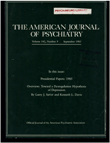Amish Study, II: Consensus diagnoses and reliability results
Abstract
Reliability of diagnosis is central to genetic research on mental illness. In the Amish Study of affective disorders, consensus diagnoses were derived by a psychiatric board using the Research Diagnostic Criteria (RDC). To verify the reliability of diagnoses, the authors 1) studied how well board members followed RDC procedures, 2) compared diagnoses based on abstracted medical records with those based on full medical records, 3) compared diagnoses based on the two data sources-- abstracted medical records and the Schedule for Affective Disorders and Schizophrenia-Lifetime Version--and 4) studied diagnostic stability to determine validity of diagnosis. The results of these substudies demonstrate a high concordance of diagnosis.
Access content
To read the fulltext, please use one of the options below to sign in or purchase access.- Personal login
- Institutional Login
- Sign in via OpenAthens
- Register for access
-
Please login/register if you wish to pair your device and check access availability.
Not a subscriber?
PsychiatryOnline subscription options offer access to the DSM-5 library, books, journals, CME, and patient resources. This all-in-one virtual library provides psychiatrists and mental health professionals with key resources for diagnosis, treatment, research, and professional development.
Need more help? PsychiatryOnline Customer Service may be reached by emailing [email protected] or by calling 800-368-5777 (in the U.S.) or 703-907-7322 (outside the U.S.).



